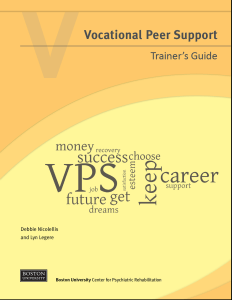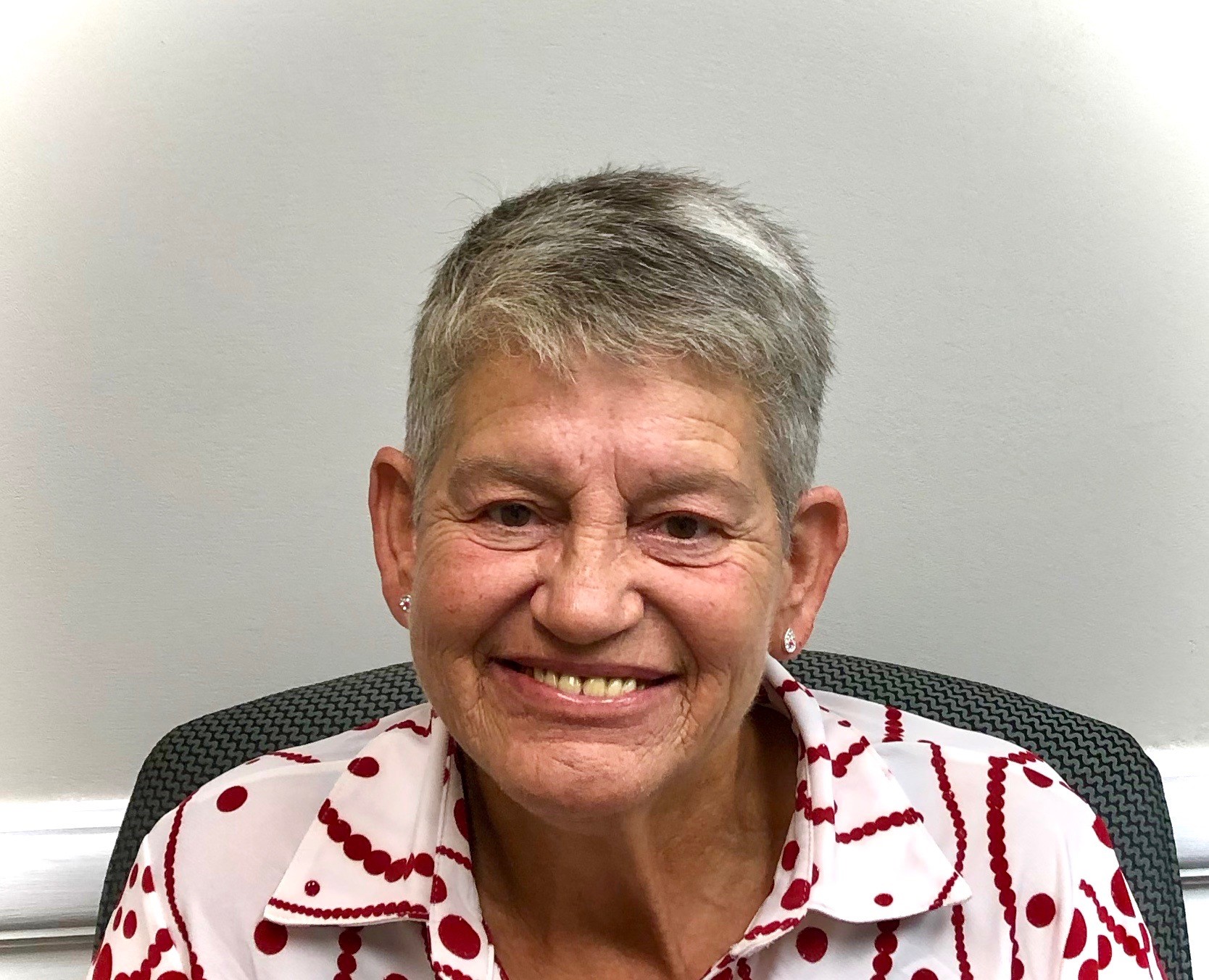Vocational Peer Support
Debbie Nicolellis and Lyn Legere

Curriculum / Workbook (PDF)
$64.97
Was: $129.95
Audience
Administrators, program managers, supervisors, practitioners, and peer support personnel may find the content of the Vocational Illness Management and Recovery curriculum useful in their work to support the vocational aspirations of people in recovery.
Additional Materials for Purchase
Description
The Vocational Peer Support Training Program: VPS is an approach designed for trained/certified peer support specialists who want to support the vocational aspirations of the people they serve. VPS is directed at supporting employment, education, and career goals. The VPS Training Program is offered as an approach for peer specialists, a curriculum and a training program for trainers, and an option for agencies who want to increase engagement in employment.
The Vocational Peer Support Training Program has four parts: Trainer’s Guide, Trainee Handbook & Toolkit, PowerPoint Slides, and Implementation Guide.
The VPS Trainer’s Guide is designed to give you tools, concepts, and lesson plans that you will need to offer a training in Vocational Peer Support. There likely will be more content in the Trainee Handbook, Training Slides, and Trainer’s Guide than you will be able to use. Having more information is better than having less; we offer this information knowing that you will need to decide the needs of your particular training group.
It is assumed that trainers of Vocational Peer Support will have had expertise-level training in both the Vocational Peer Support Training Program and a Train-the-Trainer training in Vocational Peer Support. This Trainer’s Guide will give you key instructions for conducting the training, picture and page number “anchors” to let you know where you are in the Trainee Handouts and PowerPoint slides, key questions to get class discussions going, responses to look out for, and potential responses for key discussions and exercises.
The PowerPoint Slides are sprinkled throughout the Trainer’s Guide as additional visual aids when teaching. The slides are colorful and creative examples of information presented within the teaching modules.
The material within the Trainee Handbook & Toolkit is designed to be utilized within a classroom-training environment, but may be used for independent study as desired. Here is what you will find within the Modules in this workbook:
1. Each Module has a different content focus
2. For ease, each Module has a “Content Guide” with a list of what is contained within
3. Overviews of each content area
4. Classroom Discussion Questions
5. Information about skills you will need to work with Vocational Peer Support
6. Examples of the process
7. Classroom Practice Exercises
8. Discussion Prompts for use in conversations with peers or to facilitate use of Tools
9. Tools to support explorations and decision-making in your work with peers
10. Tips and Pitfalls to Watch out for
The Implementation Guide is a supplement to the VPS Trainee Handbook and Toolkit and the VPS Trainer’s Guide. Administrators, program managers, supervisors, and peer support personnel may find the content of this Implementation Guide useful in their work to support the vocational aspirations of people in recovery. The Implementation Guide includes information and tools designed to support the use of Vocational Peer Support (VPS) in agencies and organizations. By informing the culture of organizations, supporting, and evaluating the effective use of Vocational Peer Support, including the elements of a relevant job description and other materials, the Implementation Guide is intended to provide advice for the incorporation of Vocational Peer Support into peer services currently delivered in your organization. The Implementation Guide does not supplant VPS training, rather it supplements the efforts of administrators and supervisors as they consider operationalizing ways to support individuals with vocational aspirations through the use of peer support
Citation: Nicolellis, D., & Legere, L. (2015). Vocational peer support. Boston, MA: Boston University Center for Psychiatric Rehabilitation.
Product Details
Trainer’s Guide:
PDF file: 97 pages
Published: 2015
ISBN: 978-1-878512-64-2
Trainee Handbook & Toolkit:
PDF file: 228 pages
Published: 2015
ISBN: 978-1-878512-63-5
PowerPoint Slides:
PDF file: 239 pages
Published: 2015
Implementation Guide:
PDF file: 48 pages
Published: 2015
ISBN: 978-1-878512-66-6
Table of Contents
Trainer’s Guide
- How to Use the Trainer’s Guide
- Principles and Key Concepts of Vocational Peer Support
- Modules of the VPS Curriculum
- Tips for Trainers
- Training Preparation
- Overview of the Materials
- Format of the Lesson Plan
- Lesson Plan
- Introduction to VPS Lesson Plan
- Module 1 Lesson Plan
- Module 2 Lesson Plan
- Module 3 Lesson Plan
- Module 4 Lesson Plan
- Module 5 Lesson Plan
- Module 6 Lesson Plan
- Module 7 Lesson Plan
- Module 8 Lesson Plan
- Module 9 Lesson Plan
- Module 10 Lesson Plan
- Supervising VPS Skill Use
- Example Evaluation of VPS Training
- Example Certificate of Participation
- References and Resources
Trainee Handbook & Toolkit
- Module 1 Overview of the Training Program Vocational Recovery & Vocational Peer Support
- Module 2 Partnering to Support Vocational Recovery
- Module 3 Building Motivational Foundations
- Module 4 Supporting Choice in Work and Career
- Module 5 Scaffolding Getting Into Jobs and School
- Module 6 Keeping Work and School
- Module 7 Coordinating with Employment Service Providers
- Module 8 Researching Information
- Module 9 Supporting People to Work While on Benefits (Optional 1-day Module)
- Module 10 Using the Scaffolding: How do we keep this going?
Implementation Guide
- Introduction to the Implementation Guide
- Concepts in Vocational Peer Support
- Training in Vocational Peer Support
- Skills and Tools of the VPS Training Curriculum
- For Administrators
- Introduction: Do we have what we need?
- What could a job description look like for a VPS-trained peer?
- Organizational Self-Assessment: Are we ready to offer a Training in Vocational Peer Support?
- Assessing Your Organization’s Readiness for Training in VPS Skills and Tools
- Training Assessment Key
- Understanding your Readiness for Training Assessment Score
- Developing Readiness for Training
- Program Characteristics that Reflect the Effective Use of Vocational Peer Support
- Understanding Your Score
- For Supervisors
- Introduction to VPS Supervision
- Operationalizing VPS Supervision
- VPS Practice Checklist for Supervision: Introduction and Modules 1-9
- Tips for Supervisors of VPS-trained staff
- References
Authors
Reviews
Currently, there are no published reviews for this book. If you would like to write an endorsement, please send it to: cprbooks@bu.edu

